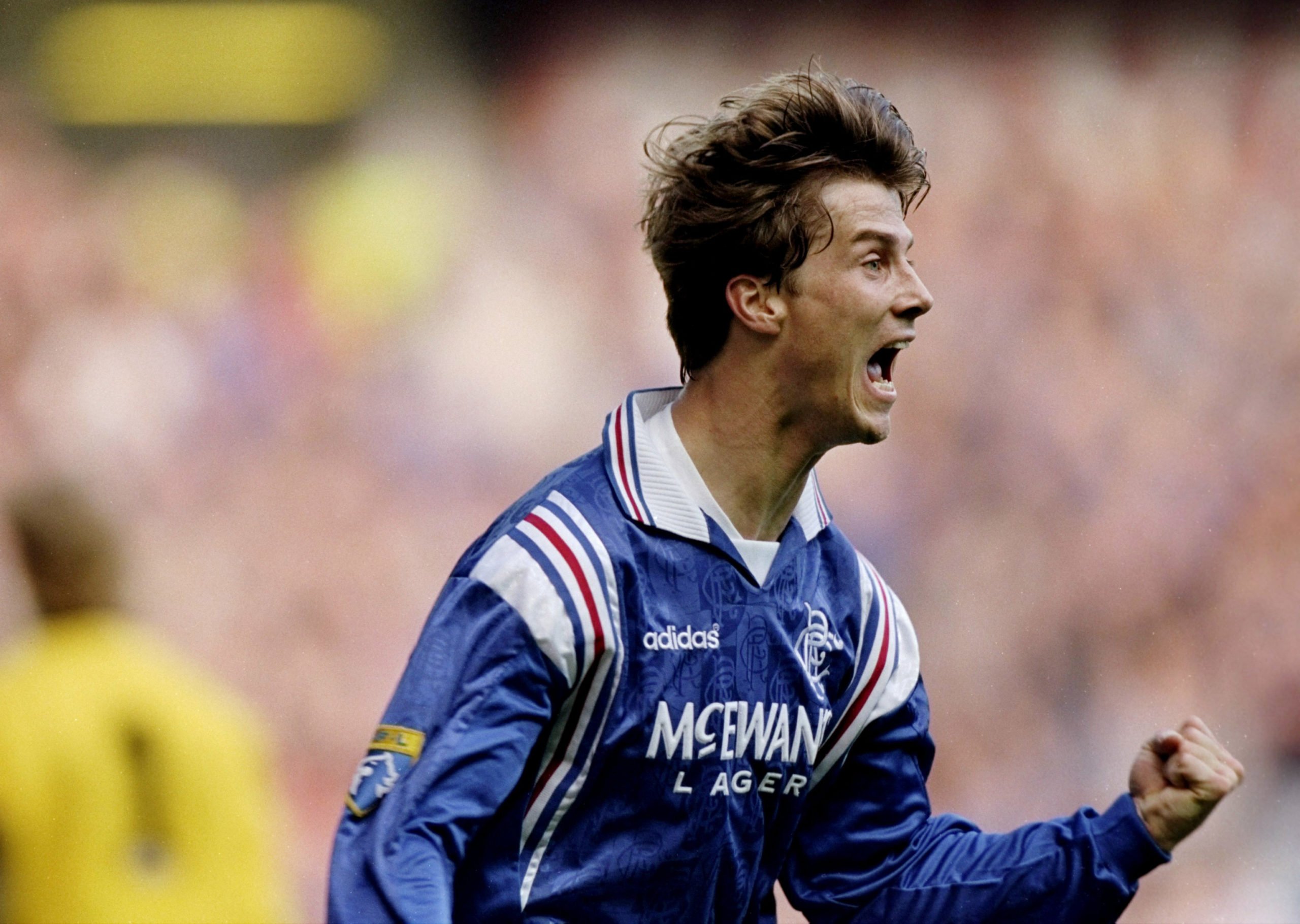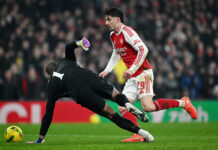Christmas 1991. Rangers are about to entertain Dunfermline at Ibrox on the back of a five game winning run. Most likely, the players and management are at home celebrating the festivities with their families. Who was lucky enough to get a much sought after Nintendo Gameboy back then? Tetris wasn’t the only building block to crumble over that festive period. Thankfully on the field, our Ibrox heroes wrapped up the points in style over the coming days, including a New Year dismantling of Celtic. However, it was events off the field that would impact not only Rangers in the short term but actually Scottish football for two decades.
December 26th 1991, saw the break up of one of the superpowers of the last 50 years. The Soviet Union was no more. A Cold War that threatened a new Ice age on the intense heat of Nuclear war was suddenly thawed out. Incidentally, the world was undecided if it was in a state of chaos or calm.
As Rangers closed out their 4th title in a row under what was Walter Smith’s first full season, we had a host of players all ready to depart for the shores of Sweden at what was the European Championships of 1992.
Ally McCoist, the new recipient of the European Golden Boot, would spearhead the Scotland attack alongside Andy Goram, Richard Gough and Stuart McCall. Former and future stars were also in attendance, including Alan McLaren, Dave McPherson, Gordon Durie and Duncan Ferguson. In the same group, the CIS, made up of the former Soviet states, would also include Oleg Kuznetsov and Alexei Mikhailichenko. The Dutch side would also have Frank De Boer and Jan Wouters (both would later find themselves at Ibrox). Basile Boli, who would soon cross our path both as an opposition player & a Ranger, represented France. There were also Jonas Thern and a 21-year-old Joachim Bjorklund of Sweden who would join the ranks a few years later. Chris Woods & Trevor Steven representing England, made up the last Rangers connections in Group A.
The other seismic occurrence that would go on and define this tournament would be the break up of what was the Former Yugoslavia. The events would go on to bring the conflict to the region for the best part of the decade with harrowing consequences. The massacre of Srebrenica is one atrocity that will forever haunt one of the most beautiful countries In Europe.
As Euro 92 was about to prepare in earnest, the Yugoslavian team was littered with talent such as Dejan Savicevic, Predrag Mijatovic, Davor Suker, Zvonimir Boban & the enigmatic Darko Pancev. A team with a real chance of winning the tournament, with many plying their trade at the Mighty Red Star Belgrade side that were the reigning European Cup holders in 1991, beating a star studded Marseille side in the final on penalty kicks.
Many of these names would subsequently join the cream of European football, such as the great AC Milan side of Capello to Real Madrid, Inter Milan and Roma.
The end of season turbulence in the Balkans was about to throw up one of the most extraordinary footballing fairy tales in history. Yugoslavia facing expulsion from Euro 92 with just two weeks to go meant a reprieve for a Danish side that should have been on their summer holidays. A side containing a certain Brian Laudrup who we will come back to shortly.

In one of the greatest sporting upsets, the Danish side would go on and win the trophy, beating the reigning World Champions Germany 2-0 in the final. This was a German side containing Jurgen Klinsmann, Mattias Sammer, Stefano Effenberg and the scorer of the world cup winning goal, the captain Andrea’s Brehme.
For some of the Danish side, this would propel their career to new heights. Peter Schmeichel, already playing for Manchester United, would be joined by John Jensen in the Premiership at Arsenal. Brian Laudrup, a Bayern Munich player, would join Fiorentina with an eventual loan move to AC Milan, where with only nine appearances, he would win a Champions League medal, despite not making the squad due to the infamous three foreigner rule which stifled clubs. The three selected that day being Marcel Desailly, Zvonimir Boban and Dejan Savicevic. Three world class players of one of the greatest European sides of the modern era.
This conundrum inadvertently helped Rangers as in the summer of 1994, Walter Smith unveiled arguably one of the greatest signings in Rangers history.
Upon his arrival in the summer of 1994 with fellow Champions league winner and old adversary Basile Boli, Laudrup would give a legendary quote about turning down Barcelona to sign for Rangers, “Before you read anything in the papers, I’ve just had an offer from Barcelona, and I’ve turned it down.”
Walters famous comeback was, “So you’d prefer to play Falkirk on a Tuesday night?”
I don’t have enough words to collate to adequately describe the genius I personally witnessed of the great Dane. Agile, lightning quick, two footed, lethal. He had everything and simply would Light up any field. Even the argument that he wasn’t good in the air was blown away by the goal that would clinch 9 in a row at Tannadice.
What we witnessed on the park was a magician—a master of his craft. Celtic were genuinely terrified of Laudrup to the extent Tom Boyd likely still suffers nightmares at the torment. Quite frankly, as we would say in Scotland, “he tore them a new one”.
For those privileged enough to have watched him, we have memories for life. For the younger ones who weren’t born or old enough to have enjoyed such a player, I suggest you acquaint yourself online with the highlight reel.
Laudrup, along with Paul Gascoigne, were two truly world class signings that signalled the intent of Rangers in the mid nineties. The Champions League was the prize above all others that David Murray craved, and the chequebook was not spared in the attempt to reach the top of the tree.
We were, without doubt, one of the biggest clubs in the UK, with only Manchester United and Liverpool in our range before Sky TV money demolished any level playing field financially. The tragedy of the Heysel disaster and the imminent five year ban of English clubs in Europe had given Scottish sides and Rangers, in particular, a significant march on our friends over the border. We could attract the cream of English football. At one point, we had the England captain Terry Butcher, goalkeeper Chris Woods, Gary Stevens at right back, and Trevor Steven at midfield.
4 England Internationals who went to the World Cup semi-finals in 1990, which included a certain Paul Gascoigne. Nowadays? You would be lucky to see change of 300 million pounds to acquire such talent. An indication of where we once were and where we have been left behind.

The three foreigner rule may have hindered Rangers with their European ambitions. However, the rule did help the National Team continue to flourish. Rangers, Celtic, Aberdeen, Hibs & Hearts would have squads littered with homegrown talent that would play regular top-flight football due to this rule. Having the best domestic talent was a policy both Glasgow sides had no choice but to pursue.
The end results saw Scotland only fail to qualify for the USA 1994 World Cup. They achieved 2 World Cups & 2 European Championship qualifications in a golden era of the nineties. Nobody could have predicted France 98 would be the last major tournament for 22 years (23 if you class it as Euro 2021). Or maybe the warning signs had actually been posted in the mid-nineties. Maybe a Scrooge policy would have saved despair further down the line.
December 1995 would arguably provide single handedly the most significant reform of European club football of all time. The ripple effects on Rangers would create shockwaves still felt 30 years on. A Belgian player who was a relative unknown in the lower leagues would become the most recognisable footballer in history.
Jean-Marc Bosman.
The 25-year-old former Belgian youth international had run his contract out with his club RFC Liege. It was a move to a lower league side Dunkerque, from the town forever entwined in British history and its small ship flotilla, Dunkirk. Unwilling to drop their asking price, Bosman’s registration was withheld, preventing him from joining any other club. Effectively his career was in limbo with his wages cut by 75%, Bosman took his case to the European Courts.
Five years later, on 15th December 1995, the European Court of justice made a landmark ruling that players under expiry of contract would be free to move without obstruction. What is known as the Bosman ruling was born. One that would crop up later with our own Prince of Denmark.
Suddenly clubs were able to pick up out of contract players for free rather than a nominal fee. Players had the power to earn better deals due to the lack of transfer fees involved. For the players, this was a landmark moment. The power was well and truly in their hands for arguably the first time. The downside was that clubs risked losing prized assets and would have to offer terms to ward off others waiting to swoop in. All in all, the transfer market had changed overnight, and more was to come.
In February 1996, UEFA president Lennart Johansen announced with immediate effect that the three foreigner rule in UEFA club competitions would cease to exist. This was a game changer across Europe.
For Rangers, it signified the extravagant and maybe somewhat reckless spending policy as they chased European glory. Walter Smith for Rangers would sign Sergio Porrini from Juventus as well as Lorenzo Amoruso of Fiorentina. 2 massive statements of intent, signing players from Serie A.
Jonas Thern, the captain of Sweden, would follow as well as the likes of Jorg Albertz from Hamburg, Joachim Bjorklund & Oleg Salenko from Valencia. Quite simply, the club were throwing everything at European success. For the Rangers support, it felt like all our Christmases had come at once.
The Bosman ruling that enabled the lavish spend also would cost the club the services of the great Dane, who had become a cult hero during trophy-laden seasons. Opting to join Chelsea on a free transfer after what was the failed 10 in a row campaign.
Dick Advocaat would take over and also take the spending to stratospheric levels. Andrei Kanchelskis, Giovanni Van Bronckhorst and Arthur Numan would arrive in big money deals. Perhaps the best signing of all value wise would be the free Bosman transfer of Rod Wallace from Leeds United, who would go on to have a sensational three seasons. 41 goals in 78 games, 2 Premier League titles, 2 Scottish Cups & 1 League Cup to add to his top-flight title won with Leeds in 1991/92.
And so it came on March 4th 2000. Rangers would entertain St Johnstone at Ibrox. The first time in the club’s illustrious history that no Scottish player would be in the starting 11. This was a shift in the game in Scotland as a result of the Bosman ruling. The adverse effect on the national team would start to take effect. Old Traditions were now falling away.
Scotland would struggle for the next two decades and not qualify for a single tournament. Another significant reason was they would struggle against teams from the former Eastern block that was once the USSR & Yugoslavia. For context, in 1990, UEFA had 32 countries in its ranks. After the break up of both the Soviet Union and the former Yugoslavia, this rapidly expanded and now UEFA currently sits with 55 nations in the 2022 World cup qualifying campaign. A perfect storm of a drain of talent combined with more competition hampered the national side.
For Rangers, the era of reckless spending would catch up and hurt those who care the most, the ordinary fan. The banks tightening the squeeze, especially after the crash of 2008, was the turning point as the club limped along with unsustainable debts as well as the murky shadow of tax issues hanging over it. You don’t need me to explain what happened next in 2012. The Snowball effect was beyond damaging. It almost destroyed everything we came to hold so dear.
The Questions I ask myself are what impact did the break up of the USSR & Yugoslavia have on our game, if any? Was the Bosman Ruling the best or worst thing to happen? Obviously, it was the best from a player’s perspective.
Would Brian Laudrup have moved to Italy and gained a Champions League winner’s medal if he hadn’t starred in Euro 92 via default? Would he have made a move to Scotland if the three foreigner rule had been scrapped sooner? After all, it did limit his time in one of the greatest Milan sides in history.
The truth is we will never know. It’s all subjective and down to the opinion of the individual.
What I will say is what a rollercoaster the nineties were as a Rangers and indeed Scotland fan. I don’t know if we will ever see the likes of Brian Laudrup again on these shores; however, what an absolute privilege it was to witness such a player in the flesh.
As always, stay humble, stay safe and remember we well and truly are the people.
Editorial Note: Did you know this article was published first on our exclusive Patreon page days back? If you love Scottish football while sick and tired of the same old biased MSM coverage, this is for you. The 4th Official needs your support. Due to the unprecedented situation as a result of the COVID 19 pandemic, the digital media space has been completely devastated. There has been a massive shortfall in revenue (even while viewership is up) as we scramble how to make sure that we go on with our daily job. We are proud to put up exclusive stuff on Scottish football as well as an early release of our podcast interviews with relevant personalities of the game (recent guests have been David Martindale, Matt Polster, Greg Docherty, Daniel Stendel & a lot more) on our Patreon account and hope you would support us in these tough times. We have supporters from atleast 9 countries, and you can be too by chipping in just £2.99/month (or become an annual supporter). Become a proud Patron of The 4th Official!





